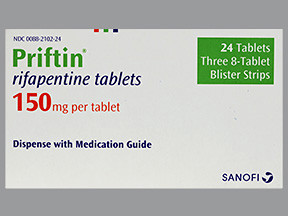RIFAPENTINE - ORAL
PHONETIC PRONUNCIATION: (riff-uh-PEN-teen)
COMMON BRAND NAME(S): Priftin
GENERIC NAME(S): rifapentine
Uses
USES: This medication is used with other medications to treat active tuberculosis (TB) of the lungs. It may also be used with another medication (isoniazid) to prevent active TB infections in people who are infected with the bacteria (people with positive TB skin test). Rifapentine is known as a rifamycin antibiotic. It works by stopping the growth of bacteria. This antibiotic treats only bacterial infections. It will not work for viral infections (such as common cold, flu). Using any antibiotic when it is not needed can cause it to not work for future infections.
How to use RIFAPENTINE - ORAL
HOW TO USE: Read the Medication Guide provided by your pharmacist before you start taking rifapentine and each time you get a refill. If you have any questions, ask your doctor or pharmacist. Take this medication by mouth with food as directed by your doctor, usually once or twice weekly. Taking this medication with food will help to decrease side effects such as stomach upset, nausea, and vomiting and also increase the absorption of this medication. The dosage is based on your weight, medical condition, and response to treatment. For the best effect, take this antibiotic at evenly spaced times. To help you remember, take it on the same day(s) of the week and at the same time each day. Mark the days on the calendar when you need to take the medication. Continue to take this medication (and other TB medications) until the full prescribed amount is finished, even if symptoms disappear. Stopping the medication too early or skipping doses may allow the bacteria to continue to grow, which may result in a return of the infection and cause the infection to be more difficult to treat (resistant). Tell your doctor if your condition persists or worsens.
Side Effects
Precautions
Interactions
Overdose
Images
Reviews
Faq for RIFAPENTINE - ORAL
Rifapentine is an antibiotic that is used to treat tuberculosis. It belongs to a group of medications called rifamycins.
Rifapentine works by inhibiting the growth and spread of tuberculosis bacteria in the body. It does this by blocking the synthesis of RNA, which is essential for bacteria to survive.
Rifapentine should be taken exactly as prescribed by your healthcare provider. It is usually taken once a week for the treatment of tuberculosis. It is important to follow the prescribed dosage and complete the full course of treatment.
If you miss a dose of rifapentine, take it as soon as you remember. However, if it is close to the time for your next dose, skip the missed dose and go back to your regular dosing schedule. Do not double the dose to make up for the missed one.
Common side effects of rifapentine include stomach upset, nausea, vomiting, headache, dizziness, and rash. If you experience severe side effects such as liver problems, allergic reactions, or unusual bleeding or bruising, seek medical attention immediately.
Yes, rifapentine can interact with several other medications, including certain antifungal medications, HIV medications, birth control pills, and certain anticoagulants. It is important to inform your healthcare provider about all the medications you are currently taking to avoid potential drug interactions.
Rifapentine may cause liver problems, so regular monitoring of liver function is essential during treatment. It can also decrease the effectiveness of birth control pills, so alternative methods of contraception should be used. Rifapentine may also cause a reddish coloration of bodily fluids, such as urine, saliva, and tears, which is normal and harmless.
Rifapentine may start working within a few weeks of starting treatment, but it is important to continue taking the medication as prescribed for the full duration of the treatment course to ensure complete eradication of the tuberculosis bacteria.
Rifapentine is generally not recommended during pregnancy or breastfeeding, as it may harm the developing fetus or pass into breast milk. However, the decision to use rifapentine should be made in consultation with a healthcare provider, weighing the potential benefits against the risks.
Disclaimer
IMPORTANT: HOW TO USE THIS INFORMATION: This is a summary and does NOT have all possible information about this product. This information does not assure that this product is safe, effective, or appropriate for you. This information is not individual medical advice and does not substitute for the advice of your health care professional. Always ask your health care professional for complete information about this product and your specific health needs.


No Reviews Yet